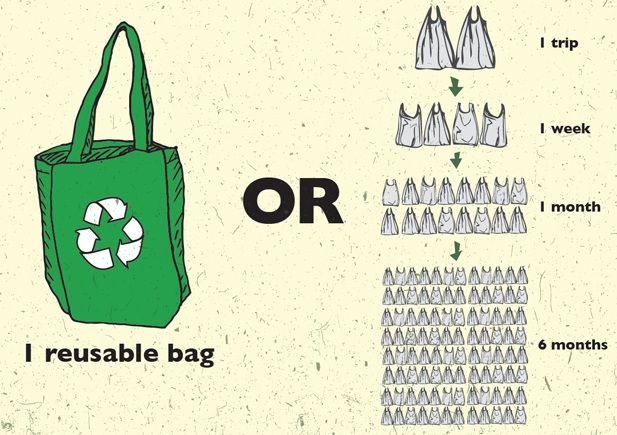
It’s becoming more and more common to see shoppers using their own cloth tote when they go shopping. Stores are beginning to pose the question, “Do you need a bag?” And many countries and companies around the world are looking to reduce their plastic use by taxing or banning plastic bags altogether.
When this happens, it leaves us with the option to either
- Pay the tax or added cost, or
- Invest in a reusable cloth bag.
Cloth bags are better than plastic bags for many reasons, but two of the biggest reasons are:
- Cloth bags are reusable, decreasing the need to use more materials for single-use production, and
- Cloth bags reduce plastic use and therefore plastic pollution
Reuse vs. Single-Use

So what are we talking about when we say ‘cloth bags’?
Cloth bags refers to any reusable bag that is not made from HDPE plastic. This ranges from natural fiber totes to recycled reusables, to backpacks and even up-cycled DIY bags.
While yes, it technically takes much less energy and resources to produce an HDPE single-use plastic bag than a reusable bag, those same resources are surmounted by the sheer magnitude of plastic bags necessary to keep up with their fleeting usefulness.
For example, we currently use 500 billion bags every year worldwide. And each one of those bags requires a significant amount of natural gas and crude oil to make. In the US alone, it takes twelve million tons of petroleum to meet the production of plastic bags for the country each year.
It also requires a significant amount of money and resources to clean up and dispose of these plastic bags. In 2004, the City of San Francisco estimated a price tag of $8.49 million per year in clean up and landfill costs for plastic bags each year.
The advantages of cloth bags are also compounded by their environmental impact. While yes, it may take up to 170 uses for a cotton bag to reach it’s “break-even” number—the number of times a bag must be used to balance it’s impact to manufacture—many reusable cloth bags are now being made from recycled materials, such as the Tern tote. These recycled, reusable totes are taking otherwise discarded plastic waste and producing long-lasting, durable cloth bags that can be used for years to come.
What kinds of cloth bags can you choose from, and how environmentally friendly are they?

When it comes to reusable cloth totes, there are two main categories: natural and synthetic.
Natural fibers, such as jute, hemp, and cotton, are especially environmentally friendly when it comes to their ability to biodegrade after they’ve fulfilled their use. Jute and hemp are also economical to grow and cultivate, making them ideal plants to harvest for materials. Cotton utilizes large amounts of water to produce, making it a bit less economical compared to alternatives.
There are also many synthetic fiber bags to consider such as polypropylene, recycled PET, and polyester. Recycled bags, such as the Tern tote, are by far the most environmentally friendly and sustainable choice because they require less energy to produce, and they’re utilizing unnecessary plastic that would otherwise go to landfill. Additionally, polypropylene bags require only 14 uses before they become more eco-friendly than HDPE bags.
The breakeven usage number for recycled bags can be less than 2.
Reducing Plastic Pollution
Cloth bags, because of their reusable nature, help reduce the amount of single-use plastic being used and inadvertently discarded into the environment.It’s estimated that nearly 8 million pieces of plastic enter oceans every day.
One of the most impactful steps we can take as individuals are to reduce our use of single plastics and substituting disposable bags with reusable cloth bags is a great start.
Cloth bags are also multipurpose, which means that you could reduce your plastic use in many areas of your life. Many people associate cloth bags with grocery shopping, which is great. But, you can also use your tote as a bag for work, school, or a trip to the beach. There are many aspects of our lives where we can consciously cut down or eliminate our plastic use. One of the easiest and most impactful ways is to invest in a cloth bag. They’re economical, more sustainable, and might just give you the peace of mind that you’re preventing plastic pollution with every use.




Leave a comment